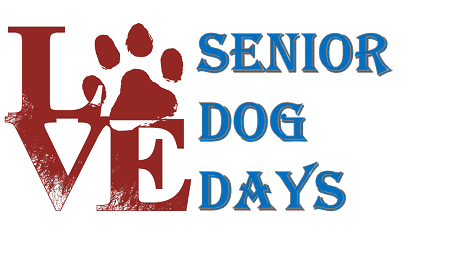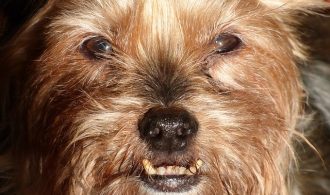Some content may contain affiliate links to products which means we could earn a fee on your purchase. Thank you for visiting
Other than cost, the most popular reason pet owners are reluctant to get their older dog’s teeth cleaned is the fear of putting their dog under (anesthesia) and thinking that their dog is too old to survive the procedure. As a result, a lot of older dogs are living out their senior years with smelly mouths that contain potentially rotting teeth and painful gums.
Research shows that numerical age is a point of consideration, but it is not the deciding factor for whether or not a dog is too old to get his teeth cleaned. The more important factors that help determine whether or not an older dog should get teeth cleaned are:
- Blood Results (organ function)
- Overall Health
A Dog’s Health vs. Age
Your veterinarian will very likely insist on a health profile blood test to verify levels are healthy enough for such a procedure. These blood tests are used to validate candidacy and are usually done within the same week (sometimes even the same day) as the actual procedure.
This is a good sign that the veterinarian you’ve chosen to perform your older dog’s teeth cleaning is mitigating the risks involved with anesthesia.
Your dog’s heart should also be functioning properly. Dogs with heart murmurs might not be good candidates depending on their stage or murmur level or your veterinarian will take extra precautions to make the procedure more accommodating to the heart murmur.
If your veterinarian is mentioning blood work and heart health, it’s a very good sign that they are well-versed on teeth cleaning.
Still, you are well within your right to ask how many procedures they’ve done in the past 6 months and their success rate.
If you feel like you have selected the right veterinarian and your veterinarian has verified your older dog to be a good candidate for a teeth cleaning under anesthesia, then there is just one more contributing factor: You.
You are an important pillar in making sure your dog will remain safe during a procedure that requires anesthesia. In other words: make sure you follow instructions perfectly.
Disclose Every Dog Medication and Supplement Before Cleaning Teeth.
Some medications or supplements (such as fish oil or omega-3) can cause thinning blood. Be sure to tell your veterinarian every single pill and supplement your older dog has been taking so they can inform you of which ones to stop prior to going under anesthesia.
Follow the Veterinarian’s Pre-Surgery Rules
Some people believe they are being asked to restrict their dog’s diet 8-12 hours before surgery simply because the veterinarian doesn’t want to deal with the possibility of defecation. This is not the reason.
Anesthesia is delivered on an empty stomach so that food does not travel up the esophagus and enter the airways during surgery causing your dog to aspirate. What is aspiration? If you’ve ever had liquid “go down the wrong pipe” then you’ve aspirated.
Aspiration is any foreign object in the airways. When it happens under anesthesia, aspiration is silent. Your dog will not be able to cough the food out of her windpipe and aspiration could be deadly.
Never assume you’re being nice to your dog by giving her a meal before surgery. Follow pre-surgery instructions to a T.
Home Remedy Dog Teeth Cleaning Route
If your dog’s teeth are not too bad, you might be able to improve oral health by committing to a home remedy schedule. This would involve daily brushing and wiping of all of your dog’s teeth or even using a waterpik (which I have transitioned to). You can read more here: Waterpik for Dogs Article and Dental Home Remedy for Dogs
However, if you’re older dog has significant plaque or tooth decay or tooth rot, a home routine will not change this. You’ll have to carefully weigh the information presented between letting your dog’s teeth and/or gum disease progress and undergoing a teeth cleaning.
Talking to friends, family, co-workers, and of course your veterinarian can help guide your decision. But the best outcomes happen when you have a
- top notch veterinarian
- top notch dog
- top notch owner: that’s you.
Thanks for visiting SeniorDogDays!

